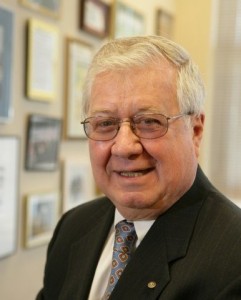By Katie Kerwin McCrimmon
A former board president and negotiator of the original hospital sale that created the Colorado Health Foundation is warning that the foundation could lose control of $1.45 billion in profits from its current proposed sale of seven hospitals and should cancel the deal.
Dick Anderson, who was chairman of the joint venture board that ran the hospitals from 1995 to 2000, filed comments with Colorados attorney general on Thursday.
He believes that the original intent of the deal was to protect community assets, not to serve as an investment engine for the Colorado Health Foundation.
Anderson said at least six former board members join him in opposing the sale, which would affect seven Denver-area hospitals including Presbyterian/St. Lukes, Rose, Swedish and Sky Ridge medical centers.
He is prepared to testify against the deal if Colorados attorney general holds hearings.
Mike Saccone, a spokesman for Attorney General John Suthers and Deputy Attorney General Geoffrey Blue, who specializes in hospital transactions, said attorneys are reviewing the proposals to determine if they will step in. They said they have no specific timetable for how long their analysis will take.
Anderson believes that local financial interests could suffer, expensive residency programs that train future doctors could close after five years and for-profit hospital owners could essentially mortgage Colorado hospitals, using them as collateral to build new out-of-state hospitals.
The (joint venture) currently does not have to respond to the whims of Wall Street that have no particular interest in our community interests or values in this rapidly changing health care delivery environment. Is the community interest best served by having these critical decisions controlled in Denver by members of the community or in Nashville, Wall Street or wherever the (joint venture) hospitals may eventually reside? Anderson wrote in his comments.

Charles Reyman
This is not a transaction about a volume of money. This is a transaction about longevity. So, what the switch of assets will provide for us is a capability to sustain our current level of grantmaking in perpetuity for generations to come, Charles Reyman, vice president of communications for the Colorado Health Foundation
He believes that the foundation board has shifted its mission and should return to its primary job of protecting community interests. During his tenure as board chair from 1995 to 2000, he said the board considered and rejected at least two offers to sell. He believes the current board is being seduced by a pot of gold.
Anderson said hes not even sure that board members understood that if the hospital disclosure law applies to this sale, the attorney general will require them to surrender the funds to a new nonprofit entity.
They may lose the dollars, he said.
Were talking about an investment in the joint venture that will provide the community control over the hospitals and a significant return (on investment) in perpetuity, Anderson said. Why give that up for a one-time payout?
Charles Reyman, vice president of communications for the foundation, said that on the contrary, the proposed sale stabilizes the foundation over the long term.
This is not a transaction about a volume of money. This is a transaction about longevity. So, what the switch of assets will provide for us is a capability to sustain our current level of grantmaking in perpetuity for generations to come, he said.
Currently, he said the foundation does not have the luxury of a long term future. We were tied to the uncertain performance of the brick and mortar asset.
Anderson believes the board should withdraw from the proposed deal with its partner, HCA-HealthOne. HCA, which stands for Hospital Corporation of America, is a Tennessee-based company now owned by Wall Street investors.
The best result would be for the Colorado Health Foundation to reconsider their action, Anderson told Solutions. If there are concerns, they can hopefully withdraw.
Reyman, said the board has no intention of canceling the deal.
He acknowledged that Anderson is correct that the $1.45 billion in profits would have to go to a new nonprofit entity if Colorados Attorney General determines that the sale falls under Colorados Hospital Conversion Act.
But Reyman said the foundations legal team and even one of the original authors of the conversion act believe that the sale will not fall under the law. Click here to read an opinion from Ed Kahn, special counsel to the Colorado Center on Law & Policy and one of the authors of the conversion act. Click here to read the Colorado Health Foundations White Paper, which spells out its point of view and to which Anderson refers in his comments.
(Disclosure: Both Solutions and CCLP receive financial support from the Colorado Health Foundation.)
At the core of the dispute and critical to the AGs decision is whether the joint venture between the foundation and HCA shares control of the hospitals in a 50-50 split or whether HCA owns 60 percent of the assets, as the foundation lawyers contend. Reyman conceded that some tax filings portray the relationship as a 50-50 split. And indeed, the board governance is split 50-50. But he said whats critical is ownership.
The 50-50 (percent split) represents the governance component of the joint venture. The 60-40 (percent split) represents the ownership component and the ownership component is at the heart of transaction, Reyman said. Its about ownership, not governance.
Is the community interest best served by having these critical decisions controlled in Denver by members of the community or in Nashville, Wall Street or wherever the (joint venture) hospitals may eventually reside? Dick Anderson, former board chair and negotiator on previous hospital sale
Reyman says that the proposed sale does not signify a change in mission.
What this transaction represents is a shift of assets from brick and mortar (hospitals) to a financial asset. What that allows the foundation to do is diversify its portfolio. Any money manager will tell you that 40 percent of your interests should not be contained in any one asset. Thats not wise stewardship moving forward.
He said that investment concerns are one component of the deliberations, but its a pretty small one.
Anderson believes that the current board failed to consult the architects of the original deal to understand their intent.
Reyman said that board members consulted with past leaders and thoroughly explored the intent of past deals.
Anderson said he learned of the proposed sale just before Health Foundation leaders announced it on June 15. He was not entirely surprised.
Its a huge amount of money and a pot of gold is always attractive to some, he said.
Anderson said he immediately registered concerns and that executives from the Colorado Health Foundation offered to meet with him. He says he told them that the time to have met would have been months earlier as they pondered the sale.
Anderson fears that the six residency programs operated by the hospitals will be in jeopardy.
I know from my prior experience that HCA has always been concerned about the cost of the (residency) programs, Anderson said.
Reyman said that the programs will actually be in better shape under the new arrangement, which requires HCA or future hospital owners to retain and fund the programs for five years.
Anderson said they could be closed on the first day of the sixth year.
Five years goes by pretty quickly, Anderson said. Who will decide at the end of five years (what should happen). Should the community in Denver decide or should it be controlled in Nashville?
Reyman said the foundation will not allow the programs to wither away. He pledged that the foundation will bear 100 percent of the cost if HCA pulls the plug.
If the transaction goes through, those programs would actually be in a strengthened position from where they are today, Reyman said. Where things stand today, those programs could end at any time. If the transaction goes through, one of the covenants mandates that they are in place, fully funded and fully functioning, for the next five years.
The foundation is 100 percent committed to those programs, Reyman said.
The health foundation picks up the tab for about $2 million per year in deficits for the educational costs of the programs. The hospitals also share in about $2 million per year in deficits for clinical costs. There are three residency programs at Presbyterian/St. Lukes, one at Rose, one at Swedish and one at the Medical Center of Aurora.
Anderson said local control is paramount to the current deal and while a community board will still exist, he worries that it wont have the muscle he had to exert at times.
For instance, he cites occasions when competing hospitals tried to interfere with one another and the board had to step in. He recalls one occasion when the for-profit hospital company, AMI, tried to stop construction of an expansion at Presbyterian/St. Lukes.
I was able to turn that around in 24 hours because we had local authority, he said.
On another occasion, the board received word that Columbia wanted to lay off 800 nurses and fought the layoffs. Anderson said he told them they didnt have the authority to proceed without the approval of the joint venture board.
The nurses were not laid off. If Wall Street says youve got too many hospitals and you have to close Rose or Swedish, should that be of community concern? I believe so, Anderson said.
Reyman said the foundation has every confidence that local interests will continue to be served.
Through our 15-plus-year relationship with the HealthOne hospitals, they have established a commitment to community benefit, to providing for indigent and Medicaid (patients) and high quality, he said. That commitment is going to continue not only because its in their culture, but because its mandated in the covenants that are part of the transaction.
The history of the past transactions is complex and includes numerous name changes.
In 1995, the for-profit company Columbia (which has since become HCA) entered into a joint venture with the nonprofit HealthONE hospital system. HCA was a private venture, but in the last 90 days has gone public and is now owned by Wall Street investors.
The 1995 merger of hospitals turned HCA-HealthONE the largest health provider in the Denver area.
In 2006, HealthOne changed its name to the Colorado Health Foundation. If the sale goes through, the foundation would become Colorados largest by far. Currently, the foundation describes itself as having $1 billion in assets. In 2009, it invested $94 million in improving health and health care in Colorado.

